Understanding the Differences: Common Cold vs. Influenza vs. COVID-19 vs. RSV
When it comes to illnesses, it’s important to know the differences between common cold, influenza, COVID-19, and RSV. These respiratory illnesses may share some symptoms, but they vary in severity and potential complications. Understanding these differences can help individuals make informed decisions about seeking medical care and taking appropriate preventive measures. In this blog, we will break down the characteristics and symptoms of each illness.
What is the common cold and how does it differ from other respiratory illnesses?
The common cold is a viral infection of the upper respiratory tract. It is caused by different strains of rhinoviruses, coronaviruses, and respiratory syncytial viruses (RSV). While it shares some symptoms with influenza, COVID-19, and RSV, there are key differences that set it apart.
Firstly, the common cold typically presents with milder symptoms compared to the other illnesses. Symptoms may include a runny or stuffy nose, sneezing, mild cough, sore throat, and mild fatigue. Fever is uncommon with a common cold, and if present, it is usually low-grade.
Another distinguishing factor is the duration of the illness. The common cold usually lasts for about 7-10 days, with symptoms gradually improving over time.
It’s important to note that the common cold rarely leads to severe complications or hospitalization, unlike influenza, COVID-19, and RSV. However, individuals with underlying health conditions or weakened immune systems may experience more severe symptoms.
Understanding the flu: symptoms, risks, and prevention strategies
Influenza, commonly known as the flu, is also a viral infection of the respiratory system. It is caused by influenza viruses and is known to cause seasonal outbreaks every year. While the flu shares similar symptoms with the common cold, COVID-19, and RSV, there are distinct differences to watch out for.
Flu symptoms often come on suddenly and are more severe than those of a common cold. They include a high fever, body aches, chills, headache, fatigue, and a dry cough. Some may also experience a sore throat and nasal congestion.
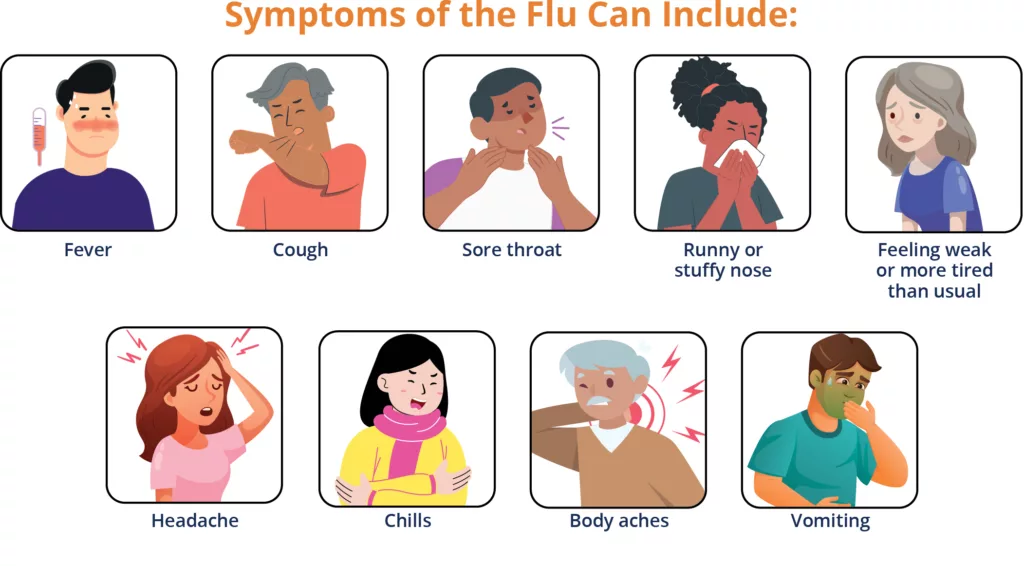
Unlike the common cold, the flu can lead to complications such as pneumonia, bronchitis, and sinus infections. It can also worsen existing medical conditions such as asthma or heart disease. This is why it is important to seek medical attention if you suspect you have the flu, especially if you are in a high-risk group.
COVID-19: the pandemic respiratory illness causing global concern
COVID-19, also known as the novel coronavirus, is a respiratory illness that is caused by the severe acute respiratory syndrome coronavirus 2 (SARS-CoV-2); and was first identified in December 2019. Since then, it rapidly spread across the world, resulting in millions of cases and numerous deaths. To date in the United States, over one million people have died from COVID-19.
COVID-19 shares some similarities with the flu, such as fever, cough, and fatigue. However, there are distinct differences that set it apart. One of the key differences is the rapid transmission rate of COVID-19, which has contributed to its worldwide spread. It is primarily transmitted through respiratory droplets when an infected person coughs, sneezes, or talks.
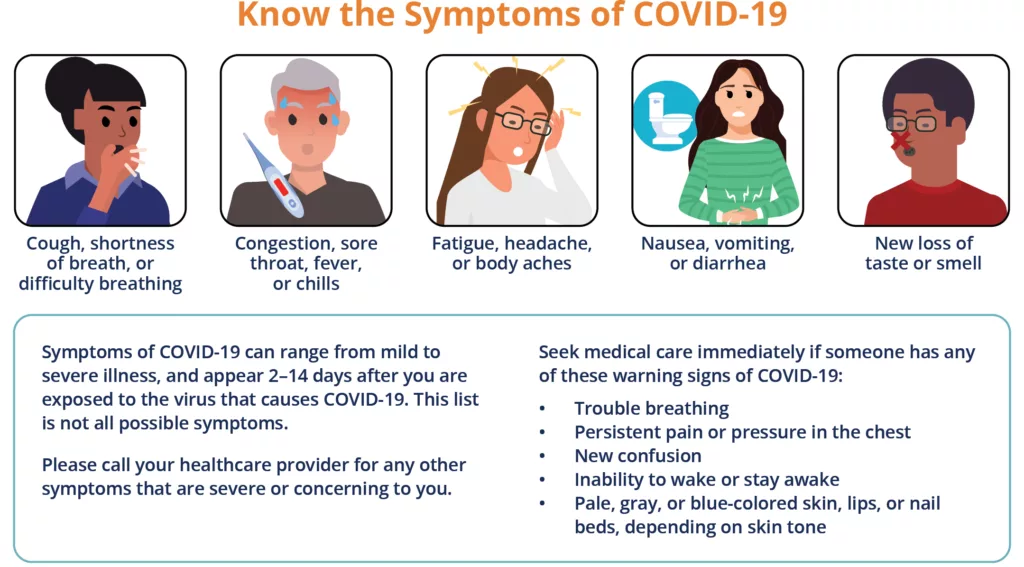
Another significant difference is the severity of COVID-19. While most cases are mild to moderate, it can lead to severe respiratory illness, particularly in older adults and individuals with underlying health conditions. In some cases, it can result in severe pneumonia and acute respiratory distress syndrome (ARDS), requiring hospitalization and intensive care. Some people including those with minor or no symptoms will develop Post-COVID Conditions – also called “Long COVID.” As defined by the CDC, Long COVID is broadly defined as signs, symptoms, and conditions that continue or develop after acute COVID-19 infection.
Recognizing RSV: a common respiratory infection in young children
RSV, short for Respiratory Syncytial Virus, is a common respiratory infection that primarily affects young children. Although it is more prevalent during the winter months, it can occur at any time of the year. RSV spreads through direct contact with respiratory droplets from an infected person or by touching contaminated surfaces.
Signs and symptoms of RSV can vary, but typically include cough, runny nose, fever, and wheezing. In some cases, it can lead to more severe respiratory problems such as bronchiolitis or pneumonia. Infants and young children, especially those with weakened immune systems or underlying health conditions, are at a higher risk of developing complications from RSV.
It is important for parents and caregivers to be aware of the signs of RSV and seek medical attention if their child exhibits symptoms. Treatment for RSV is focused on managing the symptoms and providing supportive care, such as ensuring proper hydration and rest.
How to differentiate between these illnesses and when to seek medical attention
Differentiating between the common cold, influenza, COVID-19, and RSV can be challenging, as they share many similar symptoms. However, there are some key differences that can help you determine which illness you or your loved one may be experiencing.
The common cold typically presents with a runny or stuffy nose, sneezing, cough, and mild fatigue. Influenza, on the other hand, is characterized by a sudden onset of high fever, body aches, headache, and extreme fatigue. COVID-19 often showcases symptoms of fever, dry cough, shortness of breath, and loss of taste or smell. Finally, RSV manifests as a cough, runny nose, fever, and wheezing, primarily in young children.
It is crucial to monitor your symptoms closely and seek medical attention if they worsen or if you experience severe respiratory distress, persistent high fever, or other concerning symptoms. Early intervention and proper medical care can significantly reduce complications and improve outcomes.
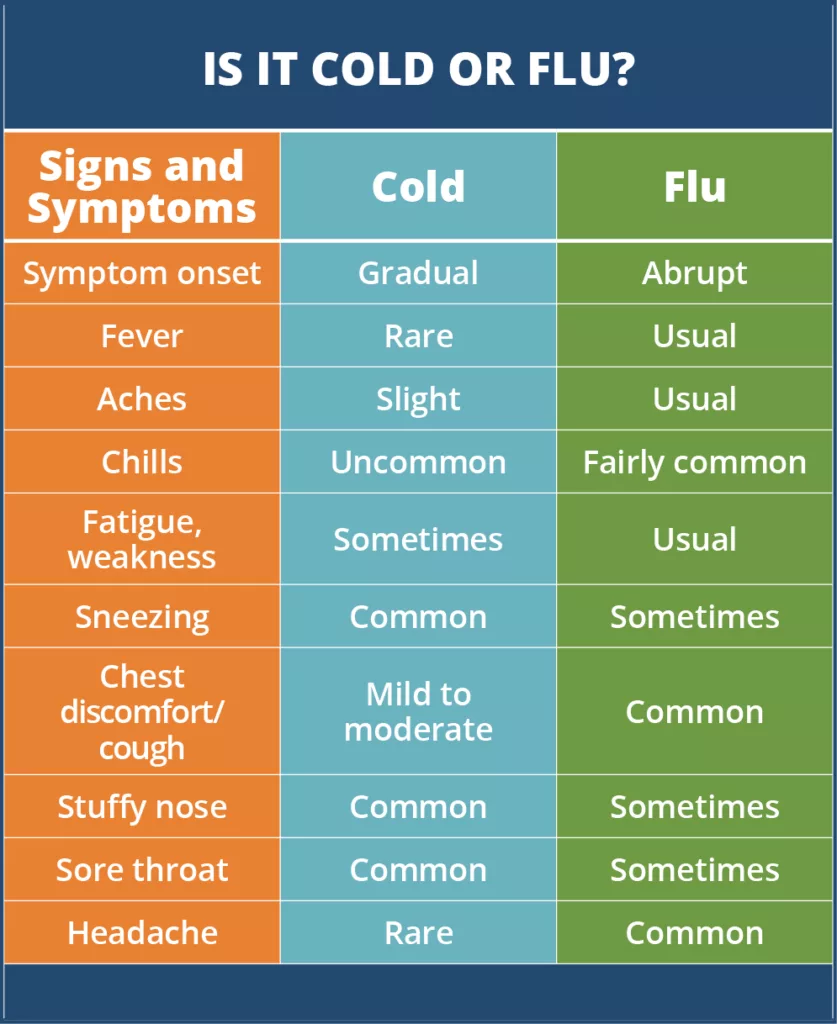
The importance of vaccination and hygiene practices in preventing the spread of these illnesses
As we have learned about the different illnesses and their respective symptoms, it is essential to understand how we can prevent the spread of these respiratory infections. Vaccination plays a vital role in protecting ourselves and others from these diseases.
For the common cold, there is no specific vaccine available. However, practicing good hygiene, such as washing hands frequently with soap and water, covering your mouth and nose when coughing or sneezing, and avoiding close contact with infected individuals can help reduce its transmission.
Influenza can be prevented through annual flu vaccines. These vaccines are designed to protect against the most common strains of the flu virus and are recommended for everyone above the age of six months. Additionally, maintaining good hygiene practices, especially during flu season, is crucial in stopping its spread.
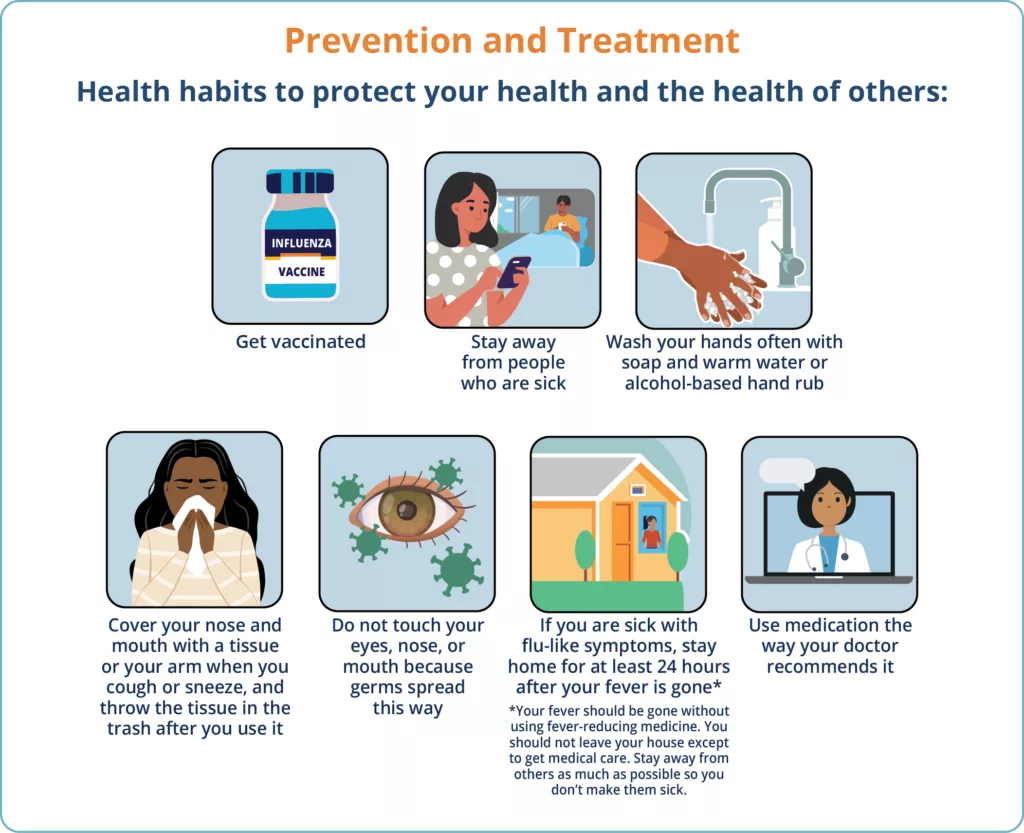
COVID-19 has brought global attention to the importance of vaccination. Several COVID-19 vaccines have been developed and proven effective in preventing severe illness and hospitalization. It is essential to stay updated with vaccination recommendations from trusted health authorities and follow public health guidelines to prevent the spread of this disease.
RSV is primarily a concern for young children, especially those under the age of two, and adults aged 60 and over. There are vaccines and immunizations available to help fight RSV. Speak with your primary care physician to find out how you or your loved ones can schedule their shots.
By following vaccination guidelines and practicing good hygiene, we can significantly reduce the risk of contracting and spreading these respiratory illnesses.
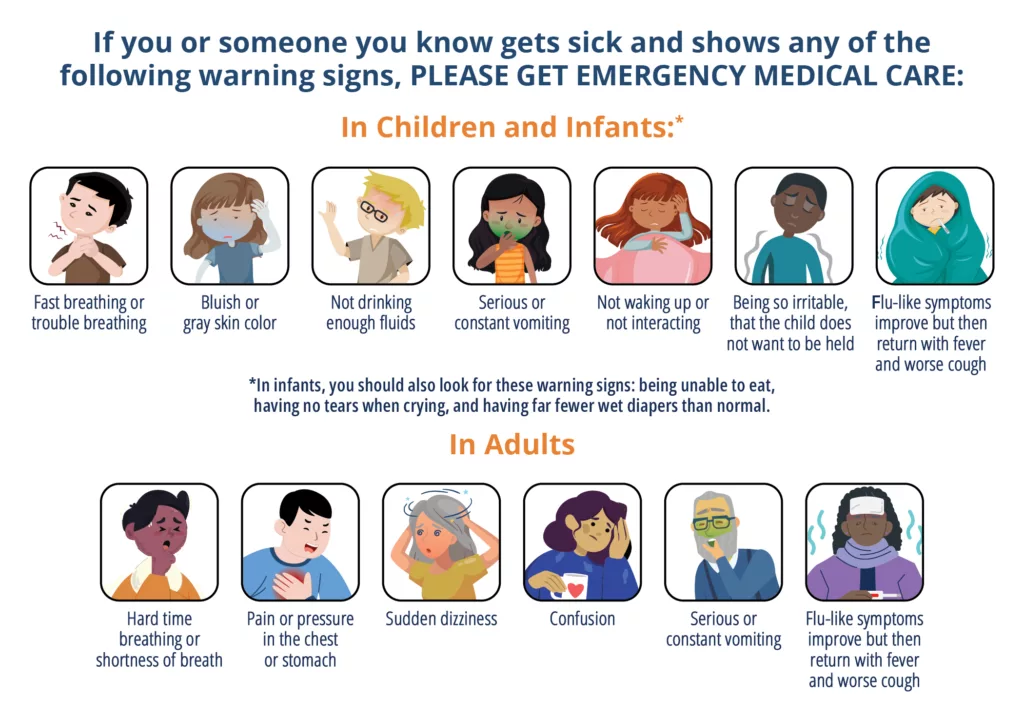
Stay informed and take precautions to protect yourself and others
Understanding the differences between the common cold, influenza, COVID-19, and RSV is crucial in effectively managing these respiratory infections. By staying informed about their symptoms and transmission methods, we can take the necessary precautions to protect ourselves and others.
While there is no specific vaccine for the common cold and RSV, practicing good hygiene and avoiding close contact with infected individuals can help reduce their spread. Annual flu vaccines are available to prevent influenza, as are COVID-19 vaccines; and staying updated with vaccination recommendations is key.
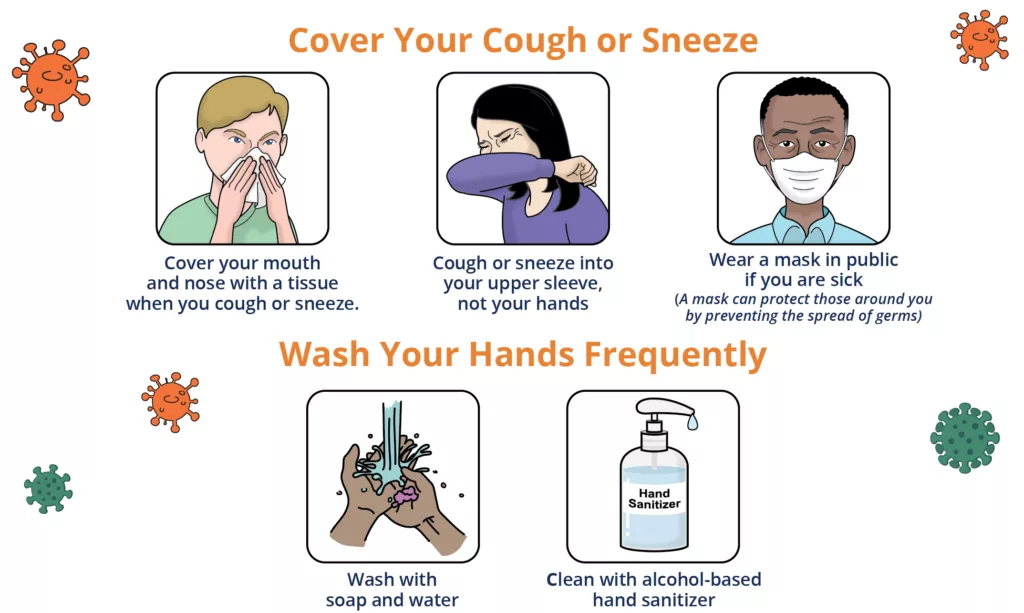
COVID-19 has highlighted the significance of vaccination in preventing severe illness and hospitalization. Keeping abreast of trusted health authorities’ recommendations and following public health guidelines are crucial steps in preventing the spread of this disease.
By incorporating these preventive measures into our daily lives, we can minimize the risk of contracting and spreading these respiratory illnesses.
True Care encourages all staff to be vaccinated for flu and COVID-19 every year to protect themselves and our clients. Stay well this winter.









